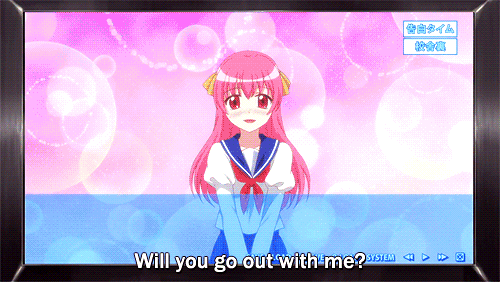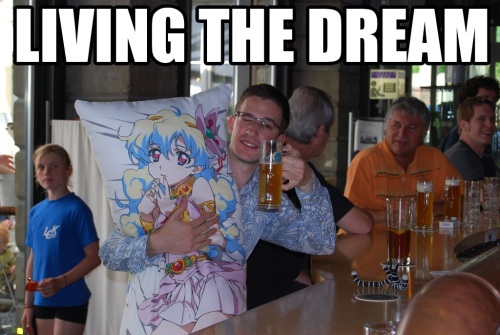[First, I’d like to apologise for using a pseudo-meme as the opening image. Second, I would like to forewarn that this post contains mention of sexual harassment and child abuse]
There is nothing wrong with loving fictional characters. When everything else in a story goes to pot, the characters and the emotional attachment we have to them are often what keeps us hooked and allows many a show that would have otherwise run itself into the ground to soldier on. The characters are what we hold dear to our hearts and imaginations, and as they are non-existent conceptual beings created for the purpose of art, copyrights aside, they are in a way ours as soon as they hit the public sphere. I’d say no harm has ever come from loving something, but if you get deep enough into some subsets of fan culture, it can have some weird outreaching connotations.
I repeat, there is nothing wrong with being passionately invested in a character. By all means, write endless meta on them, gather every piece of fan art and merchandise you can find, plaster your walls with their posters and hug a pillow with them depicted lounging on it if it makes you feel any more at home. Call them your wife or your husband or your angel or your child—if you’re with them for enough of a long haul, it can develop into a constant relationship, cheering when they succeed, weeping when they don’t, perhaps identifying with or finding a sense of emotional support in them that you haven’t found elsewhere.
This is, as most things in fandom are, all harmless fun, and being voraciously attached to a fictional person has generally helped more people than it’s hindered. It can spark trouble, of course, because fandoms are weird and subject to self-destruction like any conglomerate of vocal and passionate people, but I’m not here to examine in-fighting and accusations of your waifu being shit, if you’ll allow me to paraphrase, but the people who take this “too far” and the genuinely problematic effects it can have on the outside world.

“Waifu”, if you’re squinting at the screen wondering why I’ve made what appears to be a typo consistently, is a turn of phrase born from otaku culture based on the “Engrish” pronunciation of “wife”. It refers to a character (in this case female, though of course “husbandos” exist as well) that you feel a strong attachment to and claim a bit of ownership over, i.e. if she were real and the cosmos aligned in a way that suited you, you would probably like to marry her. It’s used to various sarcastic degrees here and there but for the purposes of this post let’s use the definition above: a fictional character you claim ownership of, usually in a romantic/sexual way.
And you know what, feel free. Objectify fictional characters, hold them to your heart, revel in the knowledge that they will never disappoint you (or the other way around), and that liking them can be a safer exploratory space than real people. Just make sure when you’re doing said objectification that you aren’t doing it in a way that could break any child pornography laws, and yes that needs to be mentioned, because it’s an unfortunate trend that a lot of the characters that attract this kind of idolisation are cute anime girls that are still in high school.
Again, they’re fictional characters, so it’s not as if they’re capable of being harmed by anything fans (or their creators, for that matter) dream up, since they are incorporeal and non-existent in the Real World. This attitude of claiming, fawning over and objectifying girls, though, is really not something we want to be breeding. Fiction does not exist in a vacuum, and neither is fan culture some sort of mythical thing that exists over the hills out of sight and mind and any relevance to everyday people.
If a boy, for an exaggerated example, spends a lot of time watching anime about cute girls, bouncing happily every time his favourite is onscreen, and scouring the internet for wrist-cushioning boob mouse mats depicting her, and then goes out in the world thinking that’s how to treat girls… well, as much as I hate to play into the stereotype of nerds not knowing how to talk to girls, it hasn’t set him up with a very good basis for interaction, has it? Embedded in a culture of loving and claiming, he may think it’s perfectly fine to express possessiveness over a real girl, whether it means getting angry at a classmate for not returning his affections (all the 2-D girls like it when he acts like this!), or harassing cosplayers of his Best Girl, or going a step further and transferring that sense of entitlement to the character’s actress.
People can make the distinction between real and fictional, of course, I’m not saying they can’t. Though this kind of behaviour has spread to celebrities plenty of times, both with boy band mania in the West and the obsessive idol culture in K- and J-Pop, sometimes leading to legitimate policy within the band management that discourages members from having relationships—because they must have a ‘pure’ image and remain attainable to the fans who adore them. They must alter their lifestyles so that their fans may continue to have their pipe dreams, eerily similar to the ideal concept of the untouchable, pure 2-D waifu that will only ever be yours in your heart and mind and dating sim route. Idols have been shamed, scandalised and stripped of their contracts for breaking that image, one singer from the group AKB48 (pictured above) even shaving her head and making a public apology to her fans after being seen on a date.
Fandom over real people is an area that’s always subject to going awry, mostly when people get to the point where they treat the stars like fictional characters. I personally draw the line at writing fan fiction about them or idolising them in ways that dehumanises them, and things that ultimately have an effect on the way that the celebrities themselves live. Is having fictional waifus a safer alternative to that madness, then? Well, it could be, and in many ways I’d rather people directed that kind of obsessive, possessive energy at people who are made up and don’t actually have to deal with it. But at the same time, that kind of behaviour in a fictional context trains people that it’s okay to transfer to the outside world.
And it’s being actively encouraged, too—you’d die of old age and lack of breath before you got to the end of the list of cute girl shows, dating sims and various games and apps that directly cater to the waifu-mongering mentality, and again, so many of them feature underage girls. It reaches a point where you’re sitting there watching a show about teenaged girls ready for some slice of life fun about high school hijinks… and you begin to realise, with a sinking feeling, after the third panty shot and sparkly close-up of a character handing the camera Valentine’s chocolates, that the show/game/comic wasn’t made for teenaged girls at all. It may star them, but they’re the last thing anyone had in mind as a target audience—that glory rests with the 20+ male demographic.
And that’s a little messed up on its own; the fact that men are taking media that young girls could have otherwise related to and using it for their own skeezy purposes, and from step one (as opposed to the terrible invasion of the Bronies, but that’s a whole ‘nother issue) with the creators actively encouraging this. Pick a waifu, any waifu, there are millions out there to choose from, sometimes fun for a little moe wish-fulfilment, but overall contributing to a larger trend of possessive weirdness that is dangerous and unhealthy when translated to society outside of fan culture (not to mention the mess it can create in fan culture—refer again to cosplayer harassment that runs rampant in animanga and superhero comic fandoms alike).
I say again: love your favourites, clutch them to your chest, blog about them in all caps and fill your room with as many figures and posters and completely unnecessary pieces of merchandise (mugs? Keychains? Handkerchiefs?) as you see fit to prove your admiration. But there comes a point where this possessive, objectifying attitude becomes dangerous. Ultimately there’s nothing wrong with liking fan-service-cluttered cute girl shows and the swimsuit edition figures they spawn in droves, but the message it can perpetuate in large doses is that treating young girls like playthings made just for your entertainment, however sexual that may be, is totally okay (and there’s a multi-million dollar industry for it, so hey, it might be a career opportunity).
And yes, those characters were created purely for entertainment and to ride a sliding scale of titillation to wish-fulfilment, but if enough of that stuff saturates the media and the marketplace (I repeat: wrist-supporting boob mouse mats) that message can embed itself in people’s brains and have an effect on how they view the world and view women, and disturbingly, mostly teenaged girls. If a market for this didn’t exist, we wouldn’t have to see perfectly innocent lines and colours arranged to depict girls in ridiculous positions that pander to an audience that can, in many cases, drown out and put off viewers who might have actually recognised themselves in and enjoyed the work. When was the last time a show about schoolgirls came out that was legitimately made for schoolgirls?
I think the answer here is all things in moderation, and all things within legal boundaries (and no, I don’t care if the character is 18, if she looks 12, I’m afraid you are a skeeze by general viewing of society and the law). If you say your waifu is the best girl and froth at the mouth to defend and profess your devotion to her, power to you, my friend—just keep that attitude in your computer when you close it and leave the house.




Reblogged this on The Backloggers and commented:
Way better than my try at this idea.
Excellent article. Of course people can distinguish between fiction and reality, but I think that fiction can influence how we perceive reality, especially if it’s reinforced enough.
And that point about who the true audience of the show might be is also a good (and distinctly worrying) one. As a foreigner, on the occasions I watch anime I know that my own background and the associations I bring with me mean that I’m effectively watching a different show… but I still don’t always realise just HOW different. “Possessive weirdness” is probably the best way of describing how this seems.
Pingback: ToraDora! #6: Fightin’ in the Rain | The Afictionado
Pingback: Lucky Star: A Masterpiece, for Some Reason | The Afictionado
Pingback: The Art of Being Self-Aware | The Afictionado